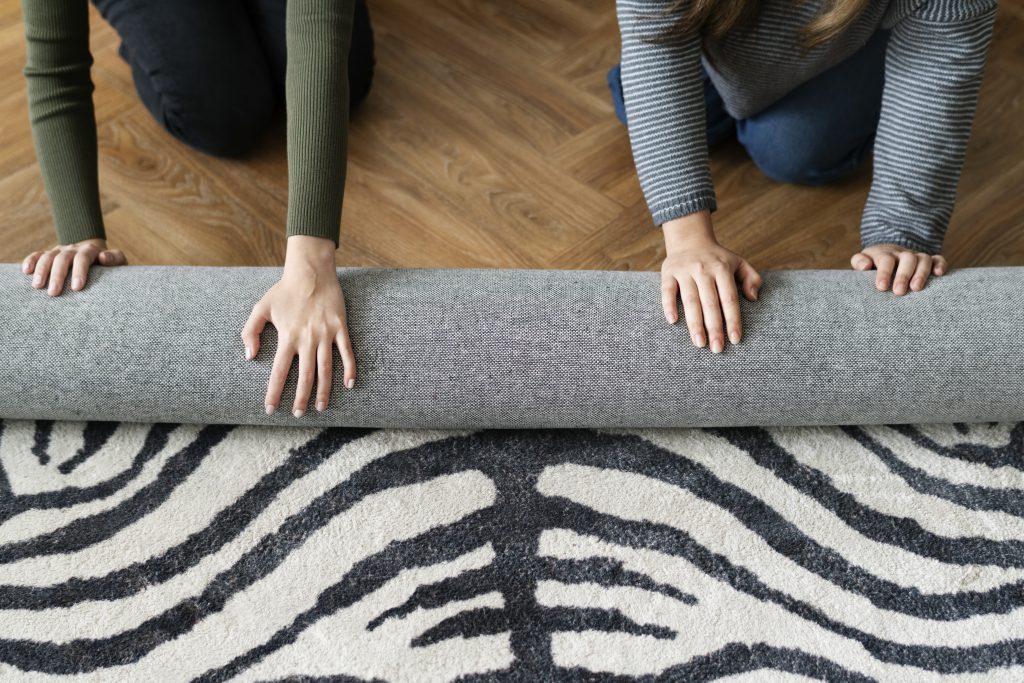 Get Tips and Tricks
Get Tips and Tricks
Top Ten Moving Tips
How often should you wash your bed sheets? Find out!
Read tips, tricks, and how-to’s on our Fabric of Life blog.
Garment Guides

Area rugs add beauty and practicality to our living spaces, protecting foot traffic and any accidental spills on floors. Due to frequent foot traffic and spillage on the area rugs require regular professional cleaning to maintain their looks and durability. Cleaning area rugs at home can be both cost-effective and convenient; here is our complete guide on doing just that! If you decide not to go through the hassle of cleaning your area rug yourself, CD One Price Cleaners offer professional area rug cleaning in Chicago for a low price and fast turnaround.
Different materials require specific care when cleaning, so before beginning any procedure on a rug, read its label to identify its material. Wool rugs require different care than silk ones, while synthetic blends have their own rules for care and upkeep.
Dust and dirt can quickly build up in your rug, wearing away at its fibers quickly. To begin the cleaning process properly, begin by thoroughly vacuuming both sides of it; this will effectively eliminate loose debris such as pet hair or dirt build-up from both sides and front of it. Avoid beating with rotating brushes as this can damage fibers of rug fibers; instead, choose the suction-only feature for best results.
Take your rug outside and give it a good shake-out; this step should dislodge any remaining particles or dirt missed when vacuuming is performed. This step may also help dislodge any remaining dust mites that might remain.
Before embarking on full-scale rug cleaning, begin with spot cleaning any visible stains first. Dab (don’t rub!) the stain with a wet cloth soaked in a mixture of water and mild dish soap solution before testing any cleaning solutions in an inconspicuous area of the rug to ensure none cause harm or discoloration to fibers.
Once spot cleaning has been completed, deep cleaning should follow. Here are a few strategies based on rug material:
Synthetic Rugs: Combine hot water and mild dish soap in a bucket before gently brushing over the entire rug with a soft-bristled brush. Rinse thoroughly after application to ensure no soap residue remains behind.
Wool Rugs: Wash wool rugs with cold water instead of warm to avoid shrinkage or damage. As wool easily holds dirt, ensure it gets rinsed frequently to maintain cleanliness.
Silk Rugs: Because these delicate textiles require gentle care to clean properly, cold water alone should do. Avoid soap unless necessary, and if using cleaning solutions instead, opt for ones with pH-neutral solutions, as this will give the best results.
After cleaning a rug thoroughly, it must be rinsed well to remove soap residue, which could attract additional dirt particles. After you’ve rinsed your rug completely, lay it flat to dry on an appropriate surface – hanging wool or silk rugs could distort their shapes; take note to allow enough drying time before returning it to its original spot to avoid mold growth or musty odors; if in a rush fans can speed up this process!
Once the rug has dried completely, its fibers may appear matted or flattened. Use a soft-bristled brush to fluff them back up for best results before brushing toward the pile.
Rotating an area rug every six months helps promote even wear over its lifetime, prolonging its longevity while ensuring its wear pattern stays even over time. This practice should prolong its longevity and ensure uniform usage over its lifecycle.
Once your rug is clean, consider protecting it further by placing rug protectors or pads beneath it for maximum defense against dirt, spills, slippage, and dye transference onto floors below! These act as additional barriers against the elements while adding a defense barrier against them all!
Always Test First: Before cleaning a rug with any product or homemade solution, always conduct an inconspicuous test in an inconspicuous area first.
Be Gentle: Aggressive brushing or scrubbing could damage fibers.
Avoid Direct Sunlight: Direct sunlight can fade the colors in a rug’s fibers over time, so for optimal drying results, select either an indoor shaded area or a room that provides adequate ventilation.
Maintain Regular Maintenance: Vacuuming on a consistent schedule, spot cleaning when needed, and deep cleaning at least annually are key parts of maintaining the beauty and functionality of an area rug.
Following these steps, you can effectively clean and care for your area rug to extend its beauty and lifespan for years. A clean rug not only looks better but it also contributes to a healthier living environment.
For more information, please see our guide on reasons to your clean your area rug.
We think you may like
 Get Tips and Tricks
Get Tips and Tricks
Top Ten Moving Tips
 Get Garment Guides
Get Garment Guides
4 Ways to Help Your Active Wear Clothing Last Longer
 Get Garment Guides
Get Garment Guides
Why It’s Important To Clean Your Area Rugs